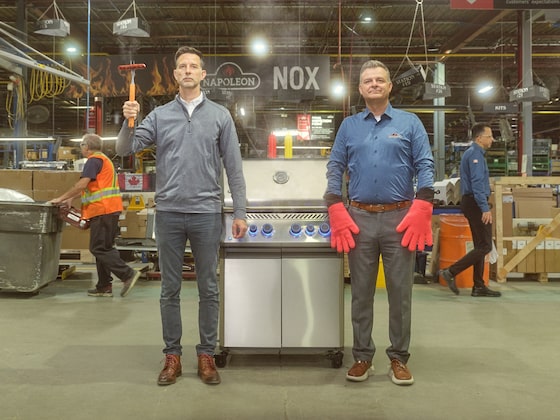The hum of activity at Napoleon’s sprawling manufacturing facility in Barrie, Ontario, represents something increasingly rare in Canada’s industrial landscape. While many consumer goods companies have long since shifted production overseas, this family-owned barbecue maker continues to manufacture approximately 50% of its products on Canadian soil.
“We’re proud of our Canadian manufacturing heritage,” says Stephen Schroeter, co-CEO of Napoleon, as he navigates through the factory floor where sheet metal transforms into gleaming stainless steel barbecues. “But that doesn’t mean it’s always the easiest path.”
The company’s journey reflects broader challenges facing Canadian manufacturers who choose to maintain domestic operations. With annual revenue reportedly exceeding $500 million, Napoleon has managed to grow while navigating the complex balance between Canadian identity and global market realities.
Founded in 1976 as a small steel fabrication business in Barrie by Wolfgang Schroeter, Napoleon began with wood stoves before expanding into barbecues. Today, the company employs over 1,500 people worldwide with products sold in more than 30 countries. Despite this international footprint, the decision to keep substantial manufacturing in Canada comes with distinct challenges.
Rising input costs present perhaps the most persistent hurdle. Steel prices have experienced significant volatility over the past three years, with benchmark hot-rolled coil steel prices swinging from around $500 USD per ton before the pandemic to over $1,900 at their 2021 peak, according to data from S&P Global Platts. Though prices have moderated somewhat, the unpredictability creates planning difficulties for manufacturers like Napoleon.
“When your primary material increases by 300% in eighteen months, that’s not something you can simply absorb or immediately pass along to consumers,” explains Chris Schroeter, who shares the co-CEO position with his brother Stephen. Both represent the second generation of family leadership at the company.
Labour costs present another significant challenge. Statistics Canada data shows manufacturing wages in Canada averaging approximately 15-20% higher than in comparable U.S. regions where Napoleon competes. This differential widens dramatically when compared with manufacturing hubs in Mexico or Asia.
Then there’s the energy equation. Despite Canada’s abundant natural resources, industrial electricity rates in Ontario have risen faster than in many competing jurisdictions. According to the Canadian Manufacturers & Exporters association, some Ontario manufacturers pay nearly twice the electricity rates of their peers in select U.S. states.
The regulatory environment adds additional complexity. “Environmental compliance, workplace safety standards, and product certification requirements are absolutely necessary,” notes Stephen, “but navigating multiple overlapping frameworks creates administrative burdens that smaller manufacturers especially struggle with.”
These challenges have forced Napoleon to make strategic compromises. While the company maintains its Canadian manufacturing presence for higher-end models and specialized products, it has established manufacturing partnerships in China and Mexico for certain product lines. This hybrid approach allows the company to maintain its “Made in Canada” credentials while remaining price-competitive across various market segments.
“The reality is that consumers want Canadian-made products until they see the price tag,” says Dennis Hale, a retail partner who has sold Napoleon products for over two decades. “There’s a premium segment willing to pay more for domestic manufacturing, but it’s not the majority of the market.”
Napoleon isn’t alone in this balancing act. Across Canada’s manufacturing sector, similar stories unfold as companies try to maintain domestic operations while facing global competition. According to Statistics Canada, manufacturing as a percentage of GDP has declined from approximately 16% in the early 2000s to around 10% today.
Yet there are advantages to maintaining Canadian operations that extend beyond patriotic sentiment. Quality control, intellectual property protection, and supply chain resilience have all proven valuable during recent global disruptions.
“When COVID hit and global shipping went haywire, we had significantly more control over our supply chain than competitors who were 100% offshore,” explains Chris. “That allowed us to maintain inventory levels that others couldn’t match.”
Innovation proximity represents another benefit. By keeping engineers, designers, and production teams in close collaboration, Napoleon has developed technical advantages that might be difficult to replicate with geographically dispersed teams.
The company has invested heavily in automation to offset higher labour costs. Walking through the Barrie facility reveals robotic welding systems, automated powder-coating lines, and computer-controlled cutting equipment that allow fewer workers to produce more units with greater consistency.
“Automation isn’t about eliminating jobs,” Stephen emphasizes. “It’s about making each worker more productive and focusing human talent on higher-value activities that machines can’t replicate.”
Looking ahead, Napoleon faces decisions that mirror Canada’s broader manufacturing dilemmas. The company recently expanded its Barrie facilities, demonstrating commitment to its Canadian base. But it simultaneously continues developing its international manufacturing capabilities.
“The ideal scenario would be creating conditions where manufacturing in Canada becomes more competitive,” suggests Chris. “That requires addressing structural cost disadvantages through policy changes, energy strategies, and productivity investments.”
Industry groups like Canadian Manufacturers & Exporters have advocated for such changes, including accelerated capital cost allowances, investment tax credits, and regulatory harmonization to reduce compliance burdens.
For consumers, the story of companies like Napoleon raises questions about the value of “Made in Canada” labels. As production becomes increasingly global, with components and assemblies crossing multiple borders, the definition of domestic manufacturing grows blurrier.
Despite these complexities, Napoleon remains committed to its Canadian identity. “Being Canadian is fundamental to our brand,” Stephen concludes. “The challenge is making that sustainable in a global marketplace where consumers make decisions based on features, quality, and price—not just country of origin.”
As barbecue season approaches and Canadians prepare to gather around their grills, few will consider the complex economic calculus behind their cooking equipment. But in manufacturing facilities across the country, companies like Napoleon continue navigating the delicate balance between national pride and market reality—one stainless steel barbecue at a time.






